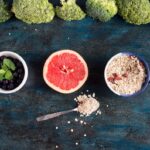Veganism, as a dietary choice and lifestyle, is increasingly visible, yet it remains shrouded in a persistent cloud of myths and misconceptions. These myths, ranging from nutritional deficiencies to impracticality and extremism, create significant barriers to understanding and adoption. They influence personal choices, public perception, and even health policies. This analysis tackles these prevalent myths head-on, employing a 360° reality check.
We dissect common falsehoods using evidence from Nutritional Science, the grounding of Ethical Frameworks, data from Environmental Science, insights from Everyday Practitioners, and context from Cultural Observation. By systematically debunking myths surrounding protein, essential nutrients (like B12), health impacts, cost, enjoyment, naturalness, and social feasibility, we aim to replace fiction with fact, fostering a clearer, evidence-based understanding of plant-based living in 2025.
The Myth Matrix: A Multi-Lens Debunking
We will now address several pervasive myths, examining each through the lenses of our different perspectives.
Myth 1: “Vegans Can’t Get Enough Protein” / “Plant Protein is Incomplete”
- LENS 1 (Nutritional Science): Reality Check
- Protein Needs: Most adults need around 0.8 grams of protein per kilogram of body weight (more for athletes, pregnant/lactating individuals, older adults). This is easily achievable on a varied vegan diet.
- Essential Amino Acids (EAAs): While animal proteins contain all EAAs in proportions similar to human needs (“complete”), plant foods also contain all EAAs. Some may be lower in one or two (e.g., grains lower in lysine, legumes lower in methionine), but this is irrelevant when eating a variety of plant foods throughout the day. The body maintains a pool of amino acids, negating the outdated need for “protein combining” at every meal.
- Abundant Sources: Excellent vegan protein sources include lentils, beans, chickpeas, tofu, tempeh, seitan, edamame, nutritional yeast, quinoa, nuts, seeds, and even whole grains and vegetables contribute.
- Nutritional Deep Dive: Amino Acid Powerhouses: A cup of cooked lentils boasts ~18g protein, 4oz firm tofu ~10-12g, 3 tbsp hemp seeds ~10g. Variety ensures a full EAA profile easily.
- Protein Needs: Most adults need around 0.8 grams of protein per kilogram of body weight (more for athletes, pregnant/lactating individuals, older adults). This is easily achievable on a varied vegan diet.
- LENS 2 (Everyday Practitioner): Reality Check
- Millions of vegans, including elite athletes (e.g., tennis players like Novak Djokovic (though dietary details vary), F1 drivers like Lewis Hamilton, numerous bodybuilders and endurance athletes), thrive and perform at peak levels, demonstrating the adequacy of plant protein. Simple meals like lentil soup, tofu stir-fry, or bean burritos are packed with protein.
- Voice of Experience (Vegan Athlete): “The protein myth is the first one everyone asks about! Honestly, I eat beans, lentils, tofu, nuts, seeds… I track my intake, and hitting my protein goals is never an issue. Recovery is great, energy is high. It’s a non-issue with a little planning.” – Ravi Patel, Amateur Triathlete.
- Millions of vegans, including elite athletes (e.g., tennis players like Novak Djokovic (though dietary details vary), F1 drivers like Lewis Hamilton, numerous bodybuilders and endurance athletes), thrive and perform at peak levels, demonstrating the adequacy of plant protein. Simple meals like lentil soup, tofu stir-fry, or bean burritos are packed with protein.
- LENS 3 (Cultural Observer): Reality Check
- The Western obsession with excessive protein is partly a result of decades of meat and dairy industry marketing. Many traditional diets globally, centered on rice, beans, corn, or tubers, supported entire civilizations without this hyper-focus on protein quantity.
Myth 2: “Vegan Diets Lack Essential Nutrients (B12, Iron, Calcium, Omega-3s)”
- LENS 1 (Nutritional Science): Reality Check
- Vitamin B12: This is the one nutrient vegans must consciously obtain from fortified foods or supplements. B12 is produced by microorganisms (bacteria), not plants or animals themselves. Animals get it from contaminated soil/water or supplements in their feed; humans historically got it similarly. Modern sanitation reduces natural exposure. Reliable vegan sources: fortified plant milks, nutritional yeast, breakfast cereals, marmite (check labels), and supplements. Deficiency is serious (neurological damage) but easily preventable.
- Iron: Plant-based (non-heme) iron is less bioavailable than animal (heme) iron, BUT vegan diets are often rich in iron overall (lentils, tofu, spinach, fortified cereals). Absorption is significantly increased by consuming Vitamin C alongside iron-rich foods (e.g., beans with salsa, spinach salad with lemon dressing). Iron deficiency anemia is common globally across all dietary patterns, not exclusive to vegans.
- Calcium: Abundant in fortified plant milks/yogurts, calcium-set tofu, leafy greens (kale, collards, bok choy – less available from high-oxalate spinach), tahini, almonds, broccoli. Focus on consistent intake from diverse sources.
- Omega-3s (EPA/DHA): Plant foods offer ALA (flax, chia, hemp, walnuts), which the body converts to EPA/DHA, but conversion rates can be low and variable. While ALA has benefits, direct EPA/DHA (crucial for brain/eye health) is best obtained from microalgae oil supplements – a clean, sustainable source, bypassing fish.
- Hidden Benefit: Vegan diets are typically higher in Fiber, Vitamin C, Vitamin E, Magnesium, Potassium, Folate, and Phytonutrients than typical Western diets, offering numerous health advantages.
- Vitamin B12: This is the one nutrient vegans must consciously obtain from fortified foods or supplements. B12 is produced by microorganisms (bacteria), not plants or animals themselves. Animals get it from contaminated soil/water or supplements in their feed; humans historically got it similarly. Modern sanitation reduces natural exposure. Reliable vegan sources: fortified plant milks, nutritional yeast, breakfast cereals, marmite (check labels), and supplements. Deficiency is serious (neurological damage) but easily preventable.
- LENS 2 (Everyday Practitioner): Reality Check
- Incorporating fortified foods (e.g., plant milk on cereal) or taking a daily B12 supplement is a simple, routine habit. Checking bloodwork periodically is advisable for everyone to monitor nutrient levels, regardless of diet. Finding iron or calcium-rich plant foods becomes second nature with practice.
Myth 3: “Veganism is Inherently Unhealthy / Leads to Deficiencies”
- LENS 1 (Nutritional Science): Reality Check
- Major Health Organizations: Leading bodies like the Academy of Nutrition and Dietetics (USA), Dietitians of Canada, British Dietetic Association, and others state that well-planned vegan diets are healthful, nutritionally adequate, and may provide health benefits in the prevention and treatment of certain diseases, and are appropriate for individuals during all stages of the life cycle.
- Reduced Chronic Disease Risk: Large-scale epidemiological studies (e.g., Adventist Health Study-2, EPIC-Oxford) consistently link vegan diets with lower rates of obesity, type 2 diabetes, hypertension, cardiovascular disease, and certain types of cancer. This is attributed to higher intake of fiber, fruits, vegetables, nuts, and lower intake of saturated fat and cholesterol.
- Critical Reassessment: The “Junk Food Vegan” It’s crucial to distinguish between a whole-food vegan diet and one high in processed vegan junk food (chips, sugary drinks, refined grains, processed mock meats). Like any dietary pattern, a poorly planned vegan diet lacking essential nutrients or high in processed foods can be unhealthy. The potential benefits are tied to well-planned approaches.
- Major Health Organizations: Leading bodies like the Academy of Nutrition and Dietetics (USA), Dietitians of Canada, British Dietetic Association, and others state that well-planned vegan diets are healthful, nutritionally adequate, and may provide health benefits in the prevention and treatment of certain diseases, and are appropriate for individuals during all stages of the life cycle.
- LENS 4 (Everyday Practitioner): Reality Check
- Many individuals report positive health changes after adopting a well-planned vegan diet, such as weight loss (if overweight), improved digestion, increased energy levels, and better management of chronic conditions (though individual results vary).
Myth 4: “Vegan Food is Expensive”
- LENS 4 (Everyday Practitioner): Reality Check
- This myth persists largely due to the visibility of expensive processed vegan alternatives (mock meats, gourmet cheeses). However, a diet built on staples – dried beans, lentils, rice, oats, potatoes, pasta, seasonal produce – is demonstrably one of the most affordable ways to eat. Strategies like buying in bulk, cooking from scratch, meal planning, and shopping at discount stores drastically reduce costs.
- Cost Comparison: Ounce for ounce, or calorie for calorie, lentils or beans are significantly cheaper protein sources than meat or even basic cheese.
- LENS 5 (Cultural Observer): Reality Check
- Globally, plant-based staples form the foundation of frugal diets for billions. The perception of veganism as expensive in Western contexts is relatively recent and linked to consumer trends and marketing, not the inherent cost of basic plant foods.
Myth 5: “Vegan Food is Bland / Restrictive / Unsatisfying”
- LENS 4 (Everyday Practitioner): Reality Check
- This reflects unfamiliarity. Global cuisines offer infinite variety using plant-based ingredients, spices, herbs, and cooking techniques. Textures range from creamy (cashew sauces) to hearty (lentil loaf) to chewy (seitan). Satisfaction comes from nutrient density, fiber, flavor, and volume. Taste buds also adapt over time, often becoming more sensitive to subtle flavours.
- LENS 5 (Cultural Observer): Reality Check
- Think of the flavour profiles of Indian, Thai, Ethiopian, Italian, Mexican, or Mediterranean cuisines – many of their most iconic and delicious dishes are naturally vegan or easily adapted. Restrictiveness is subjective; many vegans find it opens up a new world of ingredients and culinary exploration.
Myth 6: “Being Vegan is Unnatural for Humans”
- LENS 1 (Nutritional Science): Reality Check
- Humans are physiologically adaptable omnivores. Our teeth (mix of incisors, canines, molars) and gut length are suited to digesting both plants and meat. However, our ability to thrive on a well-planned plant-based diet demonstrates it is biologically possible and sustainable. We don’t require animal products to be healthy, especially with modern knowledge of nutrient needs (like B12).
- LENS 5 (Cultural Observer): Reality Check
- The “appeal to nature” is a logical fallacy. Many things humans do are “unnatural” (wearing clothes, using computers, modern medicine). Furthermore, human dietary history is diverse, with many populations subsisting on heavily plant-predominant diets for millennia. What is “natural” is less relevant than what is healthy, sustainable, and ethical today.
- LENS 2 (Ethical Framework): Reality Check
- Our capacity for ethical reasoning and choice is arguably a key part of human nature. Choosing not to cause unnecessary harm to sentient beings, when we have alternative means of sustenance, can be seen as a highly developed human trait, making veganism a valid ethical progression, regardless of Paleolithic diets.
Myth 7: “Veganism is Extreme / Difficult / Socially Isolating”
- LENS 4 (Everyday Practitioner): Reality Check
- Difficulty: It involves a learning curve, like any significant lifestyle change. Reading labels, planning meals, learning new recipes takes initial effort but becomes routine. The increasing availability of vegan options in stores and restaurants (especially in 2025) makes it progressively easier.
- Social Aspects: Navigating social events requires communication and sometimes planning (checking menus, bringing a dish). While occasional awkwardness can occur, it’s often manageable. Finding local or online vegan communities provides support and normalization.
- Voice of Experience (Long-term Vegan): “Sure, back in the 90s it was tough! Now? Supermarkets are full of options, restaurants almost always have something or can adapt. The biggest ‘difficulty’ is often just fielding repetitive questions based on these myths! Finding community helps immensely.” – Priya Sharma, Vegan for 25 years.
- LENS 5 (Cultural Observer): Reality Check
- What’s considered “extreme” is culturally relative and shifts over time. Vegetarianism was once seen as extreme. With growing awareness of health, environmental, and ethical issues tied to animal agriculture, veganism is becoming increasingly normalized and mainstream in many societies.
- LENS 2 (Ethical Framework): Reality Check
- Many principled stances throughout history (abolitionism, suffrage) were initially deemed “extreme.” If one accepts the ethical premises regarding animal sentience and exploitation, then veganism appears as a consistent, non-extreme response. The “extremism” may lie in the practices veganism opposes.
PERSPECTIVE INTERSECTION MATRIX
- Nutritional Science (Lens 1) provides the hard data to refute health/deficiency myths, empowering Practitioners (Lens 4).
- Cultural Observation (Lens 5) contextualizes the origins of myths (marketing, tradition), helping Ethical Advocates (Lens 2) and Practitioners (Lens 4) understand resistance.
- Practical Experience (Lens 4) demonstrates the real-world feasibility, countering myths about difficulty, cost, and taste, supported by Nutritional facts (Lens 1).
- Ethical Frameworks (Lens 2) reframe debates like “naturalness” and “extremism,” adding depth beyond pure nutrition or practice.
- Environmental Science (Lens 3), while not directly debunking most common myths, counters narratives suggesting veganism is environmentally insignificant, providing broader justification often relevant to practitioners’ motivations.
Key Turning Points In Myth Perpetuation/debunking
- Perpetuation:
- Aggressive post-WWII marketing by meat/dairy industries embedding protein/calcium myths.
- Rise of low-carb/paleo diet trends (late 90s/2000s) often demonizing plant foods.
- Sensationalist or poorly researched media reports focusing on rare negative outcomes or isolated studies.
- Marketing of expensive niche vegan products reinforcing the “veganism is costly” myth.
- Debunking:
- Publication of large cohort studies (Adventist Health, EPIC-Oxford) showing positive health outcomes (ongoing).
- Clear position statements from major global dietetic associations (early 2000s, regularly updated).
- Widespread availability of reliable B12 supplements and fortified foods.
- Influential documentaries reaching mass audiences (e.g., Forks Over Knives, The Game Changers).
- Internet/Social Media enabling rapid information sharing, community building, and visibility of thriving vegans (including athletes).
- Mainstream restaurants and food companies offering accessible vegan options, normalizing the choice.
SYNTHESIS & RECOMMENDATIONS
Myths surrounding veganism are widespread but largely unsupported by scientific evidence, practical experience, or ethical consistency. They often arise from outdated information, industry marketing, cultural inertia, or a misunderstanding of nutritional science. A multi-lens analysis reveals that:
- Well-planned vegan diets are nutritionally adequate and linked to health benefits.
- Meeting nutrient needs (including protein, iron, calcium) is achievable with planning; B12 requires supplementation/fortification.
- Veganism can be highly affordable and delicious, drawing on global cuisines and budget staples.
- It is biologically possible and increasingly socially feasible.
- Arguments about “naturalness” or “extremism” often overlook ethical dimensions and cultural context.
Recommendations:
- Seek Credible Sources: Rely on registered dietitians/nutritionists specializing in plant-based diets, peer-reviewed scientific literature, and position statements from major health organizations. Be wary of anecdotal claims or biased sources.
- Think Critically: Question the origins of information. Is it based on evidence or assumption? Is there an industry bias?
- Focus on “Well-Planned”: Emphasize that the benefits of any diet depend on its quality. Promote variety and nutrient awareness within veganism.
- Engage Respectfully: When discussing myths, use evidence and “I” statements based on experience, avoiding judgment.
- Celebrate Accessibility: Highlight budget-friendly approaches and diverse cultural plant-based traditions to counter elitist myths.
By addressing misinformation with facts and diverse perspectives, we can foster a more accurate and constructive conversation about the role of plant-based eating for individual, planetary, and ethical well-being.
FURTHER AREAS OF EXPLORATION
- The Science of Nutrient Bioavailability in Plant Foods
- History of Meat and Dairy Marketing Tactics
- Logical Fallacies Commonly Used in Anti-Vegan Arguments (Appeal to Nature, Straw Man, etc.)
- Media Literacy: How to Evaluate Health Claims Online
- Navigating Difficult Conversations About Veganism with Family and Friends
- The Spectrum of Plant-Based Diets (Flexitarian, Vegetarian, Vegan)
- Addressing Uncommon Vegan Myths (Soy Myths, Plant Sentience, etc.)












